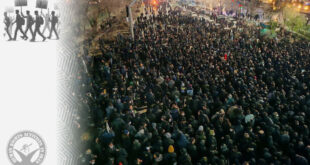BAGHDAD (AP) — The chief judge in Saddam Hussein’s genocide trial said Thursday that he did not believe the former Iraqi leader was a dictator, sparking demands from Kurds that he be removed from the case.
Judge Abdullah Amiri made his remark in a friendly chat with Saddam during court proceedings, a day after the prosecution said the judge should step down because he is biased towards the defence. Two hours after the comment about Saddam, Amiri abruptly postponed the session until Monday for what he called “technical reasons,” without having heard from a third scheduled witness. No further explanation was given. Saddam and his co-defendants are being tried on charges of committing atrocities against Kurds during a military campaign codenamed Anfal nearly two decades ago in which prosecutors say 180,000 Kurds died. The exchange between the judge and Saddam came when a 57-year-old Kurdish farmer testified that the ex-president aggressively told him to “shut up” when he pleaded for the release of nine missing relatives during the Anfal crackdown.
“Why did he try to see Saddam Hussein if Saddam Hussein was a dictator and was against the Kurdish people,” Saddam said, referring to himself.
The judge interrupted: “You were not a dictator. However, the people or the individuals and officials surrounding you created a dictator [out of you], it was not you in particular. It happens all over the world.” “Thank you,” Saddam responded, bowing his head in respect.
A Shiite Muslim, Amiri has served as a judge for 25 years — but unlike many judges during Saddam’s rule, he was not a member of the ruling Baath Party, a fellow judge in the Saddam tribunal said, speaking on condition of anonymity because he was not authorised to talk to the press. Amiri worked as an investigative judge, then a prosecuting judge in a Baghdad criminal court. Some members of such nonpolitical courts were not required to be Baath members.
Court spokesman Raed Juhi acknowledged in a press conference later that Amiri may have misspoken, but it “does not affect his objectivity” or the outcome of the trial.
“We as Kurdish politicians ask for a change in judges. He must be replaced,” Mahmoud Othman, a Kurdish member of parliament told the Associated Press.
“If Saddam isn’t a dictator as he says, then there’s never been a dictatorship in the world. This provokes the Kurdish street and is against the truth. It angers the victims and hurts their feelings,” he said.
Jaafar Moussawi, the top prosecutor of the Iraqi tribunal, played down the significance of Amiri’s comments. “Every judge has his own strategy in running the court. In my view … he was too lenient with the defendants and their lawyers and the administration of the court. He imagines that by this leniency he will keep the court in control.” But he said he was confident in the final verdict in the trial, noting that the ruling is reached by a majority vote among the five-judge panel.
On Wednesday, chief prosecutor Munqith Faroon demanded Amiri step down, accusing him of bias towards the deposed leader and his co-defendants.
“You allowed this court to become a political podium for the defendants,” Faroon told Amiri.
The prosecutor said the judge was giving Saddam time to make “political” statements that were irrelevant to the proceedings.
“For instance yesterday, instead of taking legal action [against Saddam], you asked his permission to talk,” Faroon said. “The action of the court leans towards the defendants.” On Tuesday, Saddam bellowed against “agents of Iran and Zionism” and vowed to “crush your heads” after listening to Kurdish witnesses allege atrocities committed against them during the 1987-1988 Anfal campaign.
Amiri’s style was in sharp contrast with that of the chief judge in Saddam’s first trial, which concerned a crackdown on Shiites in the town of Dujail in the 1980s. In that trial, Chief Judge Raouf Abdul-Rahman was criticised by the defence for being too harsh on them, since he aggressively put down outbursts by Saddam and his co-defendants and even made sneering comments about oppression during Saddam’s rule.
A verdict in the nine-month-long Dujail trial is expected October 16, and Saddam could face execution by hanging if convicted.
 Eurasia Press & News
Eurasia Press & News


